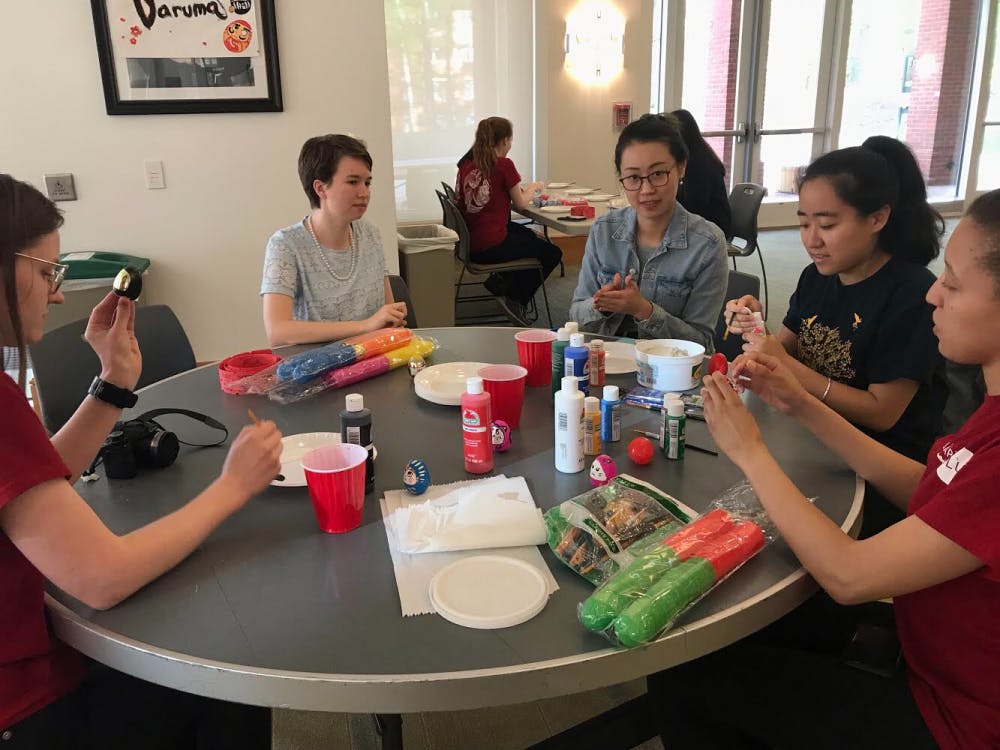Nestled among the first-year dorms, Ern Commons was unusually filled with the smells of sushi, images of students throwing darts at a board and even more students huddled around an intense game of Kahoot — all trademarks of a quintessential festival, also known as Matsuri. Matsuri is a Japanese word that means “festival”, referencing a celebration with games, performances and food relating to Japanese culture.
Japan Club held Spring Matsuri at Ern Commons Sunday, April 22 from 6 p.m. to 8:30 p.m. Approximately 100 University students and Charlottesville community members attended.
The event incorporated various activities, both traditional and modern dances and unique Japanese cuisine not easily accessible in Charlottesville. One dish that was served was takoyaki, a ball-shaped Japanese snack made of a wheat flour-based batter and filled with minced octopus and kamaboko, a type of cured surimi in a roll.
Japan Club is dedicated to promoting and facilitating interest for the Japanese language and culture within the University and the Charlottesville community.
Third-year Engineering student Thu Tran serves as the president of Japan Club and explained the role of the club.
“We provide a social platform for people who are interested in learning about Japan Club or interested in learning the language,” Tran said. “For the culture side, we do a lot of dances and cultural events like Matsuri [because] festivals are very big in Japan.”
Typically, Japanese festivals often have booths for different games and activities. Japan Club tried to replicate that at Matsuri with six booths, each with a different activity.
The first activity allowed attendees to practice cutting kamaboko, which is a loaf-like fish cake. Next, the Japan Club had a photo booth with traditional clothes to try on. There was also a dart-playing station because this is a very popular game in Japan.
At another booth, event-goers learned how to make takoyaki. The final station featured a build-your-own-daruma activity. A daruma is a Japanese egg-shaped doll, often exquisitely decorated with bold colors and patterning. This doll is significant because it always rolls back up after being pushed down, symbolizing resilience.
The club also had a trivia game with many prizes, as well as performances of traditional and modern dances from Japan Club Dance, a dance club within the Japan Club.
Fourth-year Engineering student Anna Wu has been a performer with Japan Club Dance for the past three years and spoke to the types of dances showcased at the Matsuri. Wu explained that this year’s dance merged both traditional and modern elements.
“We normally perform traditional and contemporary dances,” Wu said. “Contemporary dances can go from having a fusion of traditional elements and dresses with modern pop or rock songs. [For] traditional dances, we did festive dances, for example. In Japan, they do it in a big group in a certain formation, like 30 to 40 people in a rectangle.”
In addition to dancing, Wu also performed a musical selection from the musical “Rent” in Japanese.
“The Japanese adapt Broadway musicals and translate the lyrics a lot of time so that people who are native Japanese speakers who can't speak English very well can also understand what the [musical is] about,” Wu said. “[It’s] a great chance to show how in Japan, you not [only] adapt a culture and translate its lyrics, but it’s a process of recreation of art, and I think that's very amazing.”
Fourth-year College student Sophia Nies also spoke to some of the greatest strengths of the Japan Club — its community and encouragement of University students to step out of their comfort zones and experience new cultures.
“When I first came [to the University.], JC was really special because it really felt like I found my place, and I stuck with it for four years,” Nies said. “Give things a chance because you may find things you didn't expect to find. It's important to advertise within the Asian community, but I think it's important to advertise outside of the Asian community as well, which is something I think the JC does really well.”
The diverse makeup of Japan Club is what Tran found special about the club and motivated her to get more involved.
“I think [Japan Club] is different from a lot of cultural [organizations] on Grounds because there are a lot of people who are [not] Japanese,” Tran said. “I think it's composed of mostly people who are very interested in Japanese culture, so I think that makes us very different.”







